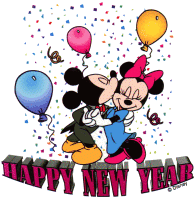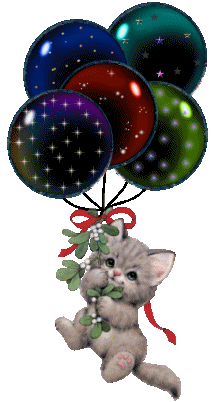Since people in different parts of the world use different calendars, the New Year is not always celebrated at the same time, nor in the same way. When different cultures created their calendars long ago, some based them on the movement of the moon, while others based them on the position of the sun. Some cultures based their calendar on qualities of both the sun and the moon. As a result, the New Year is celebrated differently around the world, and people do not necessarily share the same traditional beliefs.

The New Year in Western Society
New Year's Day is one of the world's oldest holidays, but it hasn't always been celebrated on January 1. It was first observed in ancient Babylon about 4000 years ago, around 2000 BC. Although they didn't follow a written calendar, Babylonians began celebrating the beginning of a new year on what is now March 23. Festivities lasted for eleven days, and different traditions were celebrated each day. They chose this time of year to celebrate the new year because it was springtime, when new crops were planted. It symbolized new growth and a time to look forward to the future - the same meaning that the new year holds for people today.
When the Romans came to power, they continued to observe the new year in March, in the springtime. However, the Roman calendar frequently changed based on the wishes of various emperors, and it eventually became unsynchronized with the sun. In an effort to restore a static calendar, the Roman senate declared January 1 as the official beginning of the new year in 153 B.C. Despite this law, emperors continued to tamper with the calendar for over a hundred years. It wasn't until 46 B.C., when Roman Dictator Julius Caesar created a new calendar, that January 1 was again recognized as the start of the new year. At this point, the calendar had been altered so much that Caesar was forced let the year drag on for 445 days in order to synchronize the calendar with the sun again.
As the Catholic Church expanded, it was strongly opposed to the celebration of the Roman's New Year, and denounced it as paganism. However, as Christianity became more widespread, the religious observances of the Catholic Church began to coincide with many of the pagan celebrations. On January 1, while the Romans celebrated the New Year, the Catholic Church worshipped what is still observed by some denominations today as the Feast of Christ's Circumcision. The Church continued to condemn the celebration of the New Year throughout the Middle Ages. In 1582, Pope Gregory XIII introduced a revision of Caesar's calendar, which a majority of the world now follows. Therefore, it wasn't until the late 1500s that January 1 became the official holiday celebrated by Western nations.
The modern New Year celebration prompts people to look back over the past year and forward to what the future may hold. One tradition, which dates back to the early Babylonians, is the declaration of New Year's resolutions. When people make resolutions, they choose something that will improve their lives, such as adopting an exercise program, or promising to quit smoking. Many people set aside New Year's Eve for parties, where they sing "Auld Lang Syne" and celebrate with a toast at midnight, when the New Year officially begins. On New Year's Day, many people watch football games, parades, and gather with family and friends. For many religions, it is also a holy day.






New Year Traditions Around the World
The Chinese New Year is a lunar holiday that begins with the arrival of the second new moon following the winter solstice. It usually starts between mid-January and mid-February, (date varies) and lasts for fifteen days. As the New Year approaches, people clean their home to escape bad luck in the upcoming year. Families gather for a feast on New Year's Eve, and stay up late, believing that it will prolong the lives of their elders. The Chinese people believe that evil spirits come around at New Year, so they let off firecrackers to frighten them away. People often seal their windows and doors with paper to keep the evil spirits out, as well.
On New Year's Day, people dress in their best clothes and present one another with small gifts. Chinese people all over the world celebrate the first full moon with a colorful street procession, called the Festival of Lanterns. People fill the streets carrying lanterns and join a great parade led by an enormous dragon. The Festival of Lanterns is believed to light the way for the New Year.
Celebration of the Hindu New Year varies based on geographic location. Most Hindus live in India, but many have different traditions. For example, the Hindus of Gujarat, in western India, celebrate the New Year at the end of October, at the same time as the Indian festival of Diwali. For the Diwali celebration, small oil lights are lit all along the rooftops. In northern India, people wear flowers to celebrate the New Year, commonly in pink, red, purple, or white hues. Hindus in central India display orange flags, flying them from the top of buildings. In southern India, mothers put food, flowers, and small gifts on a special tray. On New Year's morning, children must keep their eyes shut until they have been led to the tray.
Celebration of the Japanese New Year occurs on January 1, as with Western nations. However, the Japanese people also observe some beliefs from their religion, called Shinto. For happiness and good luck, Japanese people hang a rope of straw across the front of their homes. They believe it keeps the evil spirits away. Japanese people begin to laugh the moment the New Year begins, so they will have good luck the whole year.
The Jewish New Year is called Rosh Hashanah, and falls in the seventh month, or Tishri, of the Jewish calendar (September - October). Rosh Hashanah is a holy time when people reflect on the things they have done wrong in the past, so they can improve in the future. Celebration of the New Year begins at sunset the day before, and religious services are held at synagogues in observation. An instrument called a Shofar, made from a ram's horn, is traditionally played and children are given new clothes to celebrate the New Year. In addition, New Year loaves are baked and fruit is eaten to remind people of harvest time.